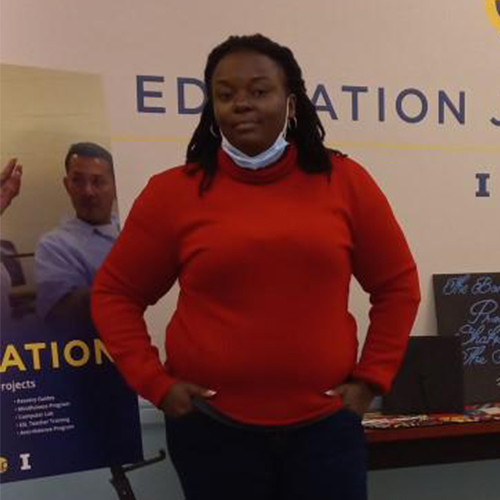Shiphrah Nantongo loves her job. She announces this fact with a verve and vitality that feels rare to American ears. Shiphrah is the Project Officer for Wells of Hope Ministries’ Safe House for Women, a Ugandan transitional home for women who have been incarcerated. When I asked her what motivates her, Shiphrah spoke with buoyancy: “I am passionate about humanity. I love to see people flourish, I believe everyone needs to feel loved, to be treated right, and that we all matter, we are all important. We are all good people, we are all deserving of all the love we get in the world. It motivates me to wake up each day and realize I can be a blessing to someone out there.”
Even beyond passion, Shiphrah is exceptionally well suited to her job. She has a degree in women and gender studies, a background in social work and research, and is herself a formerly incarcerated woman. Her work with the Safe House for Women puts all of those elements of her life to use in a way she could not have foretold. She remarks: “I feel that I am in America right now because I was incarcerated (laughs)…Things happen in your life for a reason. You might not see it right away, but eventually it becomes clear.”
Shiphrah is visiting the United States this spring to participate in training programs and to connect with donors and supporters of the Safe House, which is a program of Wells of Hope Ministries. Wells of Hope (WOH) has been one of EJP’s partner organizations since 2014.
Shiphrah herself came to WOH in 2018. She spent two weeks in prison that year and, after her release, came across an advertisement for a temporary research position with WOH. That position formed part of an EJP initiative that was exploring the feasibility of a Uganda reentry guide. As part of the research team, Shiphrah investigated available resources and ways of providing support for individuals who were leaving prison in that East African nation.
There are a number of social and cultural reasons why incarceration impacts women in Uganda differently than in the U.S.. First of all, a high percentage of Ugandan women are illiterate or semi-illiterate. These rates are significantly higher for women than for men, so women are not as equipped to handle their own legal representation or understand the charges being brought against them.
In addition, Shiphrah pointed out that “[In Uganda] we view women as saints, they’re supposed to be holy.” So a Ugandan woman who is incarcerated has broken a major element of cultural expectation. Upon release from prison, women face significant social discrimination.
Finally, it is not uncommon for a woman’s husband to remarry while she is incarcerated. Since a Ugandan woman cannot return to her parents, this essentially displaces her from the life she had known. As Shiphrah said, “When a woman gets married in Uganda, it’s like she has forfeited her position in her biological family…She’s not expected to come back to her parents’ home. So when she gets married, the only home she has is her home with her husband. When she goes to prison and the man remarries, she has nowhere else to go.”
As it became clear how tremendous the specific challenges for reentry are for Ugandan women, Susan Burton from A New Way of Life, was invited by WOH to explore a partnership. Within the year, Ms. Burton had visited Uganda, seen the conditions for herself, and offered support for a WOH-managed safe house there. In 2019, WOH hired Shiphrah as its first Project Officer.
The Safe House for Women provides reentry support for women being released from prison. Their work includes orientation, transportation services, provision of basic needs, counseling services, family reunification, skill development, and guidance surrounding attaining employment. They also organize a Formerly Incarcerated Women Association. This is an umbrella organization with 42 members that convenes monthly for women to provide one another with sisterly psycho-social support in reentering the community.

During her visit to Urbana, Shiphrah met with Lee Ragsdale, Director of EJP’s Reentry Guide Initiative, and Rebecca Ginsburg, EJP Director, to discuss resuming work on the Ugandan reentry guide. The project was stalled by COVID, and EJP is hoping to resume our work supporting this important effort. Shiphrah spoke to the value of producing short reentry videos that can be screened in Ugandan prisons and on the buses that transport incarcerated individuals to and from the courts of law.
Apart from Urbana, Illinois, Shiphrah’s itinerary in the United States includes St. Louis, MO; Indianapolis, IN; Hesston, Kansas; and Los Angeles, CA.
After we had talked for about an hour, I asked Shiphrah what her favorite aspect of her job was. She replied with her usual enthusiasm and heartfelt dedication: “The greatest aspect about this job is that I am able to create harmonious living for women as they come out of prison…They can feel comfortable enough to get out of their shells and embrace the fact that they are still an important aspect of any community.”
Thank you Shiphrah for the work that you do!

